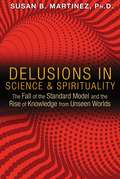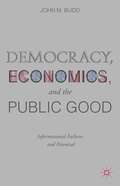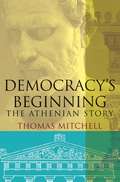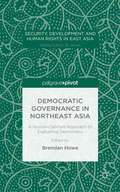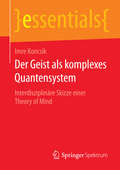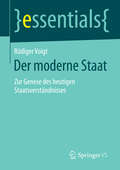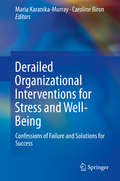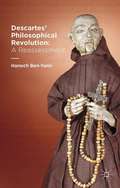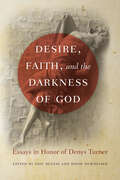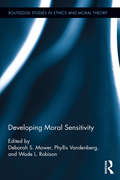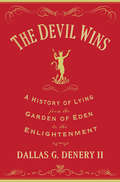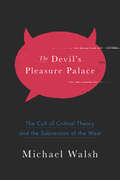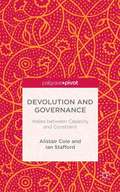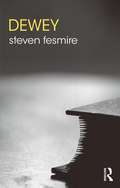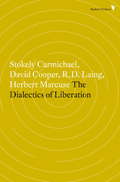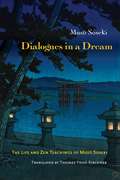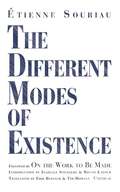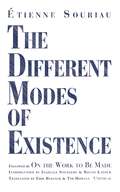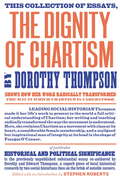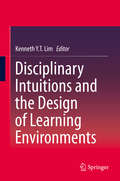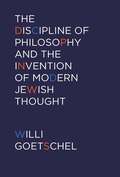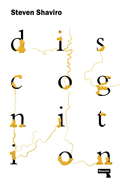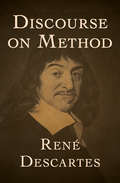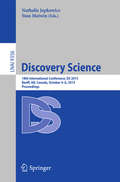- Table View
- List View
Delusions in Science and Spirituality: The Fall of the Standard Model and the Rise of Knowledge from Unseen Worlds
by Susan B. MartinezDebunks cherished theories of mainstream consensus and reveals the deeper mysteries of the science of the unseen • Reveals a new “Theory of Everything” to replace the standard model and complete our knowledge of Earth Science, anthropology, psychology, and spirituality • Explains the failings of the Big Bang, evolution, ice age theory, and global warming • Shows how the Freudian and Jungian theories of the unconscious have grossly misrepresented the spirit of man and the psyche of humanity What if science and society’s most darling theories, taught as fact, were 100% wrong? What if the anomalies that disprove these theories were covered up and distorted and any serious challenges brushed off as lunacy, hysteria, junk science, and dissension? In this primer in deprogramming, Susan B. Martinez reveals the disinformation at the root of mainstream consensus thinking. She punches gaping holes in the cherished theories of the Big Bang, Darwinian evolution, ice ages, and global warming. Drawing on the ancient science of the unseen and revelations from the Oahspe Bible as well as some of the most advanced thinkers in astrophysics, she explains a new “Theory of Everything” to replace the standard model. She explores the concept of vortexya, the cosmic whirlwind of our own geomagnetic field, which explains quite simply the subtle changes that take place on Earth and in the universe over time without the “magical thinking” of the Big Bang, global warming, or ice ages. Martinez reveals how the instability of society itself has found its way into our theories, positing explosive change and acceleration where there is none. She explains how homo sapiens’ evolution did not suddenly accelerate 40,000 years ago and culture did not accelerate to birth civilization a mere 6,000 years ago. She shows how the theories of the Freudian and Jungian unconscious and of reincarnation have grossly misrepresented the spirit of man and the psyche of humanity. Resurrecting the majestic order that was once recognized at the basis of reality, Martinez shows that the shift from the Age of Disinformation to the Age of Understanding is well underway.
Democracy, Economics, and the Public Good
by John M. BuddExamining essential aspects of American life, John Budd investigates how informational sources (print and broadcast media and other resources) fall short when it comes to informing citizens, failing our democracy and damaging the public good.
Democracy's Beginning: The Athenian Story
by Thomas N. MitchellThe first democracy, established in ancient Greece more than 2,500 years ago, has served as the foundation for every democratic system of government instituted down the centuries. In this lively history, author Thomas N. Mitchell tells the full and remarkable story of how a radical new political order was born out of the revolutionary movements that swept through the Greek world in the seventh and sixth centuries B. C. , how it took firm hold and evolved over the next two hundred years, and how it was eventually undone by the invading Macedonian conquerors, a superior military power. Mitchell's superb history addresses the most crucial issues surrounding this first paradigm of democratic governance, including what initially inspired the political beliefs underpinning it, the ways the system succeeded and failed, how it enabled both an empire and a cultural revolution that transformed the world of arts and philosophy, and the nature of the Achilles heel that hastened the demise of Athenian democracy. "
Democratic Governance in Northeast Asia: A Human-centred Approach To Evaluating Democracy (Security, Development And Human Rights In East Asia Ser.)
by Brendan HoweComprising case studies of Japan, South Korea, and Taiwan, this edited volume explores the key characteristics of democratic governance in Northeast Asia. Each democracy is assessed on the extent to which it enables the flourishing of social capital; prioritizes the interests of all as characterized by freedom from fear and want; and empowers all to participate in the democratic process and governance. With particular focus on the experience of minorities, this volume contends that the acid test of democratic governance is not how well the government represents the interests of the elites, or even the majority, but rather how it cares for the needs of vulnerable groups in society.
Der Geist als komplexes Quantensystem: Interdisziplinäre Skizze einer Theory of Mind (essentials)
by Imre KoncsikImre Koncsik beschreibt die Theorie des Geistes als naturphilosophische Theorie auf Basis der Physik. Er identifiziert signifikante Parallelen zwischen Geist und Gehirn, die beide durch Elemente der Quantentheorie und der komplexen Systemtheorie beschrieben werden können. Beide Theorien beziehen sich auf eine immaterielle, formale und imaginäre Schicht der Realität. Sie ermöglichen eine innovative Beschreibung der morphologischen Strukturen und dynamischen Aktivitätsmuster des Gehirns in Analogie zu Mustern des Geistes. Eine Theorie des Geistes bildet hinsichtlich ihrer technologischen Applikation den Grundstein einer neuen, im eigentlichen Sinn ,,intelligenten" Technologie: der quantenbasierten Systemtechnologie.
Der moderne Staat: Zur Genese des heutigen Staatsverständnisses (essentials)
by Rüdiger VoigtRüdiger Voigt gibt in diesem Essential einen Überblick über die Geschichte europäischen Staatsdenkens anhand ausgewählter Staatsdenker. Er leitet zentrale Begriffe der Staatsdiskussion wie Macht, Herrschaft, Souveränität, Gesellschaftsvertrag, Freiheit, Sicherheit und Bürokratie her und bettet die traditionelle Staatsdiskussion in gravierende Probleme unserer Zeit wie beispielsweise Terrorismus sowie Überwachung.
Derailed Organizational Interventions for Stress and Well-Being
by Maria Karanika-Murray Caroline BironProviding an overview of researchers' and practitioners' "confessions" on the fascinating phenomenon of failed or derailed organizational health and well-being interventions and contextualizing these confessions is the aim of this innovative volume. Organizational intervention failures, paradoxes and unexpected consequences can offer a lot of rich and extremely useful practical lessons on intervention design and implementation and possibly on the design of future research on organizational interventions. This volume presents lessons learned from derailed interventions and provides possible solutions to those tasked with implementing interventions. It provides an open, practical and solutions-focused account of researchers' and practitioners' experiences in implementing organizational interventions for health and well-being.
Descartes’ Philosophical Revolution: A Reassessment
by Hanoch Ben-YamiIn this book, Ben-Yami reassesses the way Descartes developed and justified some of his revolutionary philosophical ideas. The first part of the book shows that one of Descartes' most innovative and influential ideas was that of representation without resemblance. Ben-Yami shows how Descartes transfers insights originating in his work on analytic geometry to his theory of perception. The second part shows how Descartes was influenced by the technology of the period, notably clockwork automata, in holding life to be a mechanical phenomenon, reducing the soul to the mind and considering it immaterial. Ben-Yami explores the later role of the digital computer in Turing's criticism of Descartes' ideas. The last part discusses the Meditations: far from starting everything afresh without presupposing anything that can be doubted, Descartes' innovations in the dream argument, the cogito and elsewhere are modifications of old ideas based upon considerations issuing from his separately developed theories, formed under the influence of the technology, mathematics and science of his age.
Desire, Faith, and the Darkness of God: Essays in Honor of Denys Turner
by Eric Bugyis and David NewheiserIn the face of religious and cultural diversity, some doubt whether Christian faith remains possible today. Critics claim that religion is irrational and violent, and the loudest defenders of Christianity are equally strident. In response, Desire, Faith, and the Darkness of God: Essays in Honor of Denys Turner explores the uncertainty essential to Christian commitment; it suggests that faith is moved by a desire for that which cannot be known.This approach is inspired by the tradition of Christian apophatic theology, which argues that language cannot capture divine transcendence. From this perspective, contemporary debates over God’s existence represent a dead end: if God is not simply another object in the world, then faith begins not in abstract certainty but in a love that exceeds the limits of knowledge.The essays engage classic Christian thought alongside literary and philosophical sources ranging from Pseudo-Dionysius and Dante to Karl Marx and Jacques Derrida. Building on the work of Denys Turner, they indicate that the boundary between atheism and Christian thought is productively blurry. Instead of settling the stale dispute over whether religion is rationally justified, their work suggests instead that Christian life is an ethical and political practice impassioned by a God who transcends understanding.
Developing Moral Sensitivity (Routledge Studies in Ethics and Moral Theory)
by Wade L. Robison Deborah Mower Phyllis VandenbergMoral sensitivity affects whether and how we see others, note moral concerns, respond with delicacy, and navigate complex social interactions. Scholars from a variety of fields explore the concept of moral sensitivity and how it develops, beginning with a natural moral capacity for sensitivity towards others that is shaped in a variety of ways through relationships, forms of teaching, and social institutions. Each of these influences alters the capacity as well as one’s responses in complex ways. The concept of moral sensitivity deepens as progressive chapters demonstrate its increasing complexity through development within individuals, over time, as they mature, and as their relationships and social contexts expand. The chapters integrate research from philosophy, psychology, neuroscience, literature, education, and media and technology studies, with key chapters by Darcia Narváez, Nancy E. Snow, Michael S. Pritchard, and Stephen J. Thoma and a Foreword by Owen Flanagan. It is the only comprehensive presentation of interdisciplinary work on moral sensitivity that integrates a theoretical, methodological, and pedagogical analysis. This highly interdisciplinary approach provides a new way of thinking about the relationship of individuals to society and moral sensitivity as a social phenomenon, extending current research in ethics, moral psychology, and psychology toward situated, embodied, and contextual analyses.
The Devil Wins
by Dallas G. Denery IIIs it ever acceptable to lie? This question plays a surprisingly important role in the story of Europe's transition from medieval to modern society. According to many historians, Europe became modern when Europeans began to lie--that is, when they began to argue that it is sometimes acceptable to lie. This popular account offers a clear trajectory of historical progression from a medieval world of faith, in which every lie is sinful, to a more worldly early modern society in which lying becomes a permissible strategy for self-defense and self-advancement. Unfortunately, this story is wrong.For medieval and early modern Christians, the problem of the lie was the problem of human existence itself. To ask "Is it ever acceptable to lie?" was to ask how we, as sinners, should live in a fallen world. As it turns out, the answer to that question depended on who did the asking. The Devil Wins uncovers the complicated history of lying from the early days of the Catholic Church to the Enlightenment, revealing the diversity of attitudes about lying by considering the question from the perspectives of five representative voices--the Devil, God, theologians, courtiers, and women. Examining works by Augustine, Bonaventure, Martin Luther, Madeleine de Scudéry, Jean-Jacques Rousseau, and a host of others, Dallas G. Denery II shows how the lie, long thought to be the source of worldly corruption, eventually became the very basis of social cohesion and peace.
The Devil's Pleasure Palace
by Michael WalshIn the aftermath of World War II, America stood alone as the world's premier military power. Yet its martial confidence contrasted vividly with its sense of cultural inferiority. Still looking to a defeated and dispirited Europe for intellectual and artistic guidance, burgeoning trans-national elite in New York and Washington embraced not only the war's refugees, but many of their ideas as well, and nothing has proven more pernicious than those of the Frankfurt School and its reactionary philosophy of "critical theory." At once overly intellectualized and emotionally juvenile, Critical Theory - like Pandora's Box - released a horde of demons into the American psyche. When everything could be questioned, nothing could be real, and the muscular, confident empiricism that had just won the war gave way, in less than a generation, to a central-European nihilism celebrated on college campuses across the United States. Seizing the high ground of academe and the arts, the New Nihilists set about dissolving the bedrock of the country, from patriotism to marriage to the family to military service; they have sown (as Cardinal Bergoglio - now Pope Francis - once wrote of the Devil) "destruction, division, hatred, and calumny" - and all disguised as the search for truth.In The Devil's Pleasure Palace we will look at the ways Critical Theory took root in America and, once established and gestated, has affected nearly every aspect of American life and society - and what can be done to stop it.
Devolution and Governance: Wales between Capacity and Constraint
by Alistair Cole Ian StaffordThis book examines the development of Welsh devolution in the context of great economic and political uncertainty. Drawing on research carried out over more than a decade, it explores whether Welsh devolution has developed the capacity to resist internal and external pressures and to continue to pursue a distinctive political and policy agenda.
Dewey: Pragmatism In Ethics (The Routledge Philosophers)
by Steven FesmireJohn Dewey (1859 - 1952) was the dominant voice in American philosophy through the World Wars, the Great Depression, and the nascent years of the Cold War. With a professional career spanning three generations and a profile that no public intellectual has operated on in the U.S. since, Dewey's biographer Robert Westbrook accurately describes him as "the most important philosopher in modern American history." In this superb and engaging introduction, Steven Fesmire begins with a chapter on Dewey’s life and works, before discussing and assessing Dewey's key ideas across the major disciplines in philosophy; including metaphysics, epistemology, aesthetics, ethics, educational philosophy, social-political philosophy, and religious philosophy. This is an invaluable introduction and guide to this deeply influential philosopher and his legacy, and essential reading for anyone coming to Dewey's work for the first time.
The Dialectics of Liberation
by David CooperThe Congress of the Dialectics of Liberation, held in London in 1967, was a unique expression of the politics of modern dissent, in which existential psychiatrists, Marxist intellectuals, anarchists, and political leaders met to discuss the key social issues of the following decade. Edited by David Cooper, this volume compiles speeches by Stokely Carmichael, Herbert Marcuse, R. D. Laing, Paul Sweezy, and others. The collection explores the roots of violence in society. Against the backdrop of rising student frustrations, racism, class inequality, and environmental degradation, this conference aimed to create genuine revolutionary momentum by fusing ideology and action on the levels of the individual and of mass society. These speeches clearly indicate the rise of a new, forceful, and (to some) ominous style of political activity.From the Trade Paperback edition.
Dialogues in a Dream
by Muso Soseki Thomas KirchnerDrawing on his encyclopaedic knowledge, one of the most famous masters in the history of Zen leads us on a grand tour of Buddhist theology in all its timeless relevance.Muso Soseki, the renowned fourteenth century Zen master, is today most known for developing the art of traditional Japanese Zen gardening. Even more impressive is his creation of the institutional structure for all Japanese Buddhist temples, which still in use today. Dialogues in a Dream is one of the many projects Soseki took on in this final period of his life. Written in the guise of a conversation between Soseki and the shogun, the work covers the breadth of Buddhist philosophy and practice, and includes insightful discussions of prayer, mediation, and the place of study in religious life. His penetrating analysis deepens our appreciation of even the simplest Buddhist practices. Acclaimed scholar Thomas Yuho Kirchner painstakingly translates this classic text into English.
The Different Modes of Existence
by Étienne Souriau Erik Beranek Tim HowlesWhat relation is there between the existence of a work of art and that of a living being? Between the existence of an atom and that of a value like solidarity? These questions become our own each time a reality--whether it is a piece of music, someone we love, or a fictional character--is established and begins to take on an importance in our lives. Like William James or Gilles Deleuze, Souriau methodically defends the thesis of an existential pluralism. There are indeed different manners of existing and even different degrees or intensities of existence: from pure phenomena to objectivized things, by way of the virtual and the "super-existent," to which works of art and the intellect, and even morality, bear witness. Existence is polyphonic, and, as a result, the world is considerably enriched and enlarged. Beyond all that exists in the ordinary sense of the term, it is necessary to allow for all sorts of virtual and ephemeral states, transitional realms, and barely begun realities, still in the making, all of which constitute so many "inter-worlds. "
The Different Modes of Existence
by Étienne Souriau Erik Beranek Tim HowlesWhat relation is there between the existence of a work of art and that of a living being? Between the existence of an atom and that of a value like solidarity? These questions become our own each time a reality--whether it is a piece of music, someone we love, or a fictional character--is established and begins to take on an importance in our lives. Like William James or Gilles Deleuze, Souriau methodically defends the thesis of an existential pluralism. There are indeed different manners of existing and even different degrees or intensities of existence: from pure phenomena to objectivized things, by way of the virtual and the "super-existent," to which works of art and the intellect, and even morality, bear witness. Existence is polyphonic, and, as a result, the world is considerably enriched and enlarged. Beyond all that exists in the ordinary sense of the term, it is necessary to allow for all sorts of virtual and ephemeral states, transitional realms, and barely begun realities, still in the making, all of which constitute so many "inter-worlds."
The Digital Humanities
by Gardiner, Eileen and Musto, Ronald G. Eileen Gardiner Ronald G. MustoThe Digital Humanities is a comprehensive introduction and practical guide to how humanists use the digital to conduct research, organize materials, analyze, and publish findings. It summarizes the turn toward the digital that is reinventing every aspect of the humanities among scholars, libraries, publishers, administrators, and the public. Beginning with some definitions and a brief historical survey of the humanities, the book examines how humanists work, what they study, and how humanists and their research have been impacted by the digital and how, in turn, they shape it. It surveys digital humanities tools and their functions, the digital humanists' environments, and the outcomes and reception of their work. The book pays particular attention to both theoretical underpinnings and practical considerations for embarking on digital humanities projects. It places the digital humanities firmly within the historical traditions of the humanities and in the contexts of current academic and scholarly life.
The Dignity of Chartism
by Dorothy Thompson Stephen Roberts E. P ThompsonThis is the first collection of essays on Chartism by leading social historian Dorothy Thompson, whose work radically transformed the way in which Chartism is understood. Reclaiming Chartism as a fully-blown working-class movement, Thompson intertwines her penetrating analyses of class with ground-breaking research uncovering the role played by women in the movement.Throughout her essays, Thompson strikes a delicate balance between down-to-the-ground accounts of local uprisings, snappy portraits of high-profile Chartist figures as well as rank-and-file men and women, and more theoretical, polemical interventions.Of particular historical and political significance is the previously unpublished substantial essay co-authored by Dorothy and Edward Thompson, a superb piece of local historical research by two social historians then on the brink of notable careers.From the Trade Paperback edition.
Disciplinary Intuitions and the Design of Learning Environments
by Kenneth Y. T. LimMany of the chapters within draw frequent and explicit linkages to curriculum design, from the premise of the need to go beyond addressing the conceptions of learners, to seeking to understand the substrate upon which these conceptions are founded. The argument is made that this substrate comprises the particular set of lived experiences of each learner, and how - because these lived experiences are as tacit as they are diverse - designing curriculum around misconceptions and preconceptions alone would not lead to enduring understanding from first principles. From this perspective, Disciplinary Intuitions constitute an exciting field at the nexus of learning theories and curriculum design.
The Discipline of Philosophy and the Invention of Modern Jewish Thought
by Willi GoetschelExploring the subject of Jewish philosophy as a controversial construction site of the project of modernity, this book examines the implications of the different and often conflicting notions that drive the debate on the question of what Jewish philosophy is or could be. The idea of Jewish philosophy begs the question of philosophy as such. But “Jewish philosophy” does not just reflect what “philosophy” lacks. Rather, it challenges the project of philosophy itself. Examining the thought of Spinoza, Moses Mendelssohn, Heinrich Heine, Hermann Cohen Franz Rosenzweig, Martin Buber, Margarete Susman, Hermann Levin Goldschmidt, and others, the book highlights how the most philosophic moments of their works are those in which specific concerns of their “Jewish questions” inform the rethinking of philosophy’s disciplinarity in principal terms. The long overdue recognition of the modernity that informs the critical trajectories of Jewish philosophers from Spinoza and Mendelssohn to the present emancipates not just “Jewish philosophy” from an infelicitous pigeonhole these philosophers so pointedly sought to reject but, more important, emancipates philosophy from its false claims to universalism.
Discognition
by Steven ShaviroWhat is consciousness? What is it like to feel pain, or to see the color red? Do robots and computers really think? For that matter, do plants and amoebas think? If we ever meet intelligent aliens, will we be able to understand what they say to us? Philosophers and scientists are still unable to answer questions like these. Perhaps science fiction can help. In Discognition, Steven Shaviro looks at science fiction novels and stories that explore the extreme possibilities of human and alien sentience.From the Trade Paperback edition.
Discourse on Method: Large Print
by René DescartesDescartes&’s revolutionary treatise on reason and scientific thought, which sparked radical breakthroughs in mathematics, philosophy, and metaphysics After he finished school, René Descartes was left with more doubts than certainties. His Jesuit education included some of the best teaching available in mathematics, physics, and letters, and yet Descartes found the foundations of his schooling hollow. Determined to discover for himself what was real, he spent the next nine years traveling through Europe, interacting with locals of all walks of life, including nobles, soldiers, and laborers, in search of the breadth of experience that would later inspire his greatest work: Discourse on Method. When it was first published, the book offered a remarkable new approach to gaining knowledge based on reason and skepticism, the steps for which Descartes lays out sequentially, from the deconstruction of all previously held beliefs to the slow and methodical rebuilding of fact anchored in the first and most innate truth: I think, therefore I am. This ebook has been professionally proofread to ensure accuracy and readability on all devices.
Discovery Science
by Stan Matwin Nathalie JapkowiczThis book constitutes the proceedings of the 17th International Conference on Discovery Science, DS 2015, held in banff, AB, Canada in October 2015. The 16 long and 12 short papers presendted together with 4 invited talks in this volume were carefully reviewed and selected from 44 submissions. The combination of recent advances in the development and analysis of methods for discovering scienti c knowledge, coming from machine learning, data mining, and intelligent data analysis, as well as their application in various scienti c domains, on the one hand, with the algorithmic advances in machine learning theory, on the other hand, makes every instance of this joint event unique and attractive.
